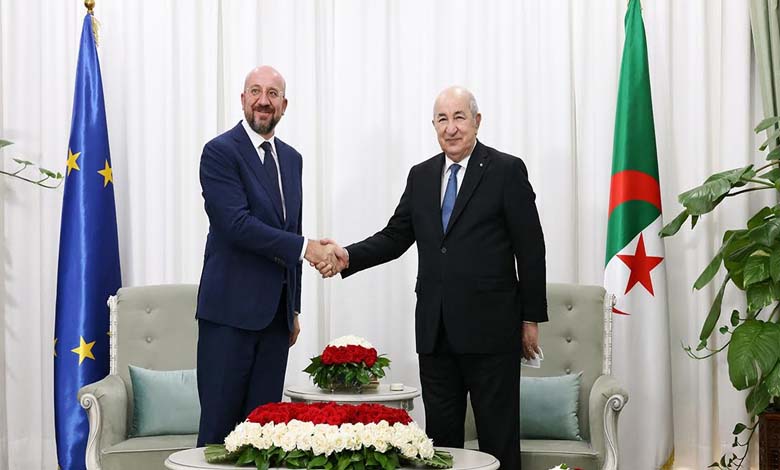EU Deepens Algeria’s Troubles by Placing It on Blacklist

Algerian authorities are attempting to deflect attention from the ineffectiveness of their widely promoted economic reforms by accusing France of exploiting political tensions to settle old scores.
-
Commitment to the Atlantic Initiative Sets the Stage for Broader Cooperation between Morocco and Sahel Countries
-
Morocco responds to the European Court of Justice: No agreement will be accepted if it does not fully respect our sovereignty
Algerian media outlets have lashed out at the European Union following the bloc’s announcement that Algeria has been added to its updated blacklist of high-risk countries in the fight against money laundering. The move has been labeled as politically motivated, particularly amid rising tensions with several EU member states, especially France. This strong backlash reveals the potential negative impact the classification may have on Algeria’s economy.
Pro-government media have sought to reframe the EU decision as a political act, promoting unofficial narratives and invoking geopolitical disputes to justify the inclusion, which obliges European financial institutions to impose enhanced scrutiny on transactions involving Algeria.
-
Ireland Refutes Algerian and Polisario Claims Regarding Ghali’s Visit to Dublin
-
After a wave of anger, Borrell apologizes for his statements “Europe is a garden” and “the world is a forest”
Although the EU’s decision is a technical measure designed to safeguard its financial system, Algerian newspaper El Khabar quoted unnamed “observers” claiming that the classification “disregards Algeria’s legislative and regulatory efforts” in combating financial crimes and raises questions about its political underpinnings.
The timing of the announcement is also highlighted, coming as Algeria’s ties with the EU are cooling, particularly due to its increasing alignment with non-European partners such as China, Russia, and Turkey, as well as ongoing tensions with France.
-
Widespread Rejection of Misrepresentations in UN Security Council Report on the Moroccan Sahara
-
Chaos Strikes Algerian Media: Exaggerated Propaganda for Tebboune Involves a Daily Newspaper
The conspiracy narrative, frequently used by Algerian authorities, has resurfaced. Some voices suggest the EU’s move could be a tactic to restrict Algeria’s economic ambitions in Africa and the Mediterranean, particularly as it pursues regional financial influence through projects like the African Union’s single currency and the BRICS initiatives.
Media reactions claim the EU’s decision blurs the line between technical and political evaluations, accusing the bloc of double standards, despite Algeria’s documented legal and institutional progress in addressing money laundering.
-
Algerian Concern Expressed by Polisario Over French Shift in Positions
-
Morocco Responds Legally to Algerian Allegations Regarding Confiscation of Real Estate for Public Benefit
France is singled out as a key actor within the EU allegedly leveraging the European framework to exert pressure and settle bilateral grievances with Algeria. Such accusations follow a familiar script, frequently employed by Algerian media when relations sour.
Diplomatic ties between Algeria and France have hit a deadlock, despite a phone call between Presidents Abdelmadjid Tebboune and Emmanuel Macron on March 31 that aimed to defuse tensions and outline a roadmap for reconciliation. However, the arrest in Paris of an Algerian consular employee in connection with the kidnapping of opposition activist Amir DZ derailed the agreement, prompting Algeria to expel twelve French diplomats, to which France immediately responded in kind.
-
An Algerian-Iranian rapprochement on the verge of discord and tensions with Morocco
-
How Did the Killing of an Algerian Teen Spark Violence in France?
Since then, retaliatory measures have escalated. Notably, Algeria arrested Franco-Algerian writer Boualem Sansal for allegedly undermining national sovereignty, while France launched a wave of arrests targeting Algerian influencers in Paris, with some facing possible deportation.
Nonetheless, portraying Algeria’s blacklisting as politically driven appears to be a deliberate attempt to divert attention from the government’s failed economic reforms.
-
After Morocco’s Protest: Sky News Arabia fires its Washington-based Algerian correspondent Reda Bouchefra
-
France tightens visa requirements for Tunisian, Moroccan and Algerian citizens
A report by Jeune Afrique notes that the EU views blacklisted countries as having “strategic deficiencies in their anti-money laundering and counter-terrorism financing systems,” which pose significant threats to the European financial system, according to Brussels.
The European Commission has added Algeria, Angola, Côte d’Ivoire, Kenya, and Namibia to its blacklist — a move aligned with the Financial Action Task Force (FATF), a global watchdog that monitors illicit financial flows. FATF members include South Africa, which is itself under EU scrutiny.
-
This punishment for those who disturb the Algerian elections… Details
-
An Algerian military trial cleared Said Bouteflika of conspiracy accusations
The Commission acknowledged that these countries have made high-level political commitments and developed action plans with FATF to address the identified gaps, but it maintains that “deficiencies remain unaddressed.”
In May 2024, the EU adopted a new institutional and legal framework, including the creation of an Anti-Money Laundering Authority with direct and indirect supervisory powers over high-risk entities in the financial sector.
However, blacklisting is not permanent. While five African countries were added on June 10, Senegal and Uganda were removed at the same time, having successfully addressed their shortcomings, according to the Commission.












